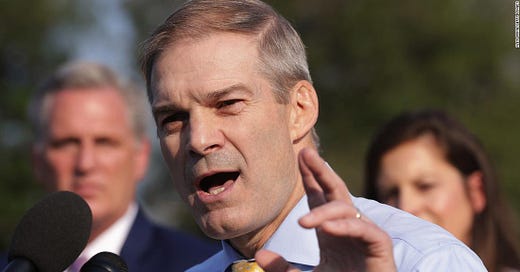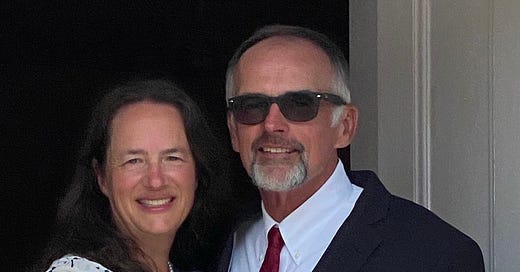
Until tonight, when Trump once again retweeted the name of the whistleblower, today has been remarkably quiet on the political front. This quiet gives me a chance to share something I found a year or so ago that, to me, illuminated the present political crisis more than anything else I have seen.
It’s a speech Robert Mueller gave in January 2011 in New York City, when he was the Director of the FBI.
Mueller explained that globalization and modern technology had changed the nature of organized crime. Rather than being regional networks with a clear structure, he said, organized crime had become international, fluid, sophisticated, and had multi-billion dollar stakes. Its operators were cross-pollinating across countries, religions, and political affiliations, sharing only their greed. They did not care about ideology; they cared about money. They would do anything for a price.
These criminals “may be former members of nation-state governments, security services, or the military,” he said. “They are capitalists and entrepreneurs. But they are also master criminals who move easily between the licit and illicit worlds. And in some cases, these organizations are as forward-leaning as Fortune 500 companies.”
These criminal enterprises, he noted, were working to corner the market on oil, gas, and precious metals. And to do so, Mueller explained, they "may infiltrate our businesses. They may provide logistical support to hostile foreign powers. They may try to manipulate those at the highest levels of government. Indeed, these so-called 'iron triangles' of organized criminals, corrupt government officials, and business leaders pose a significant national security threat."
To combat that threat, Mueller said, the FBI had shifted focus “from a law-enforcement agency to a national security service that is threat-driven and intelligence-led.”
With the FBI focusing on organized crime and national security, its interest in the connections between the Trump campaign and Russia in 2016 not only makes sense, but also illuminates what they were afraid was going on.
Trump had sought Russian business since 1996, but his financial connections with Russians really took off in 2008, when wealthy Russians poured money into Trump's US properties at a time when few others were interested in working with Trump. In September 2008, Don Jr. told a reporter: "Russians make up a pretty disproportionate cross-section of a lot of our assets.... We see a lot of money pouring in from Russia." Trump pursued the idea of a Trump Tower in Moscow, and in 2013, took the Miss Universe pageant there.
In June 2016, political consultant Paul Manafort took over the Trump campaign. For ten years, Manafort had worked for a Ukraine politician, Viktor Yanukovych, who was closely connected to Russia and whose party the US State Department called a party of “mobsters and oligarchs.” With Manafort’s help, Yanukovych won the Ukraine presidency in 2010 with the promise of rejecting NATO, the North Atlantic Treaty Organization, which organized after World War Two to protect Europe from the encroachments of the USSR, and which continued to try to contain Russian aggression after oligarchs began to monopolize the country in the 2000s. Yanukovych tried to pull Ukraine back into Russia’s orbit, and in 2014, after months of popular protests and brutal repression of them, Yanukovych fled to Russia.
Shortly after Ukraine turned Yanukovych out, Putin invaded and annexed Ukraine’s Crimea. America and the European Union imposed economic sanctions on Russia and on specific Russian businesses and oligarchs, prohibiting them from doing business in their territories. Those sanctions crippled Russia and froze the assets of oligarchs.
Manafort had made millions from his connections to Yanukovych and his friends—including Dmytro Firtash, who we now know gave Giuliani associate Lev Parnas $1 million, which Parnas spread around to certain Republican politicians-- but their ouster found him about $17 million in debt to them and to their ally, Russian president Vladimir Putin.
In 2016, Manafort’s friend and business partner Roger Stone was advising Donald Trump’s presidential campaign. Manafort began to help in March 2016, and was present at the June 9 meeting between Donald Trump, Jr., Jared Kushner, and a number of other people, including a Russian lawyer associated with Russian intelligence services (that is, a spy). Rick Gates, who worked for Manafort when he was with the Trump campaign, testified before lawyers working for Mueller when he was Special Counsel investigating Russia’s interference in the 2016 election, and my read of his testimony suggests that the people at the June 9 meeting discussed smearing Hillary Clinton.
Three days later, on June 12, Julian Assange tweeted that Wikileaks had damaging information on Clinton and would release it. On June 20, Manafort became Trump’s campaign chairman, working for free. Between July 18 and 21, the platform committee of the Republican National Convention abruptly watered down a plank in the Republican platform that had called for arming Ukraine to fight Russian forces.
When then-FBI Director James Comey opened a counterintelligence investigation into Russian interference in the 2016 election at the end of July, he was operating in a bureau that had been pursuing Mueller’s iron triangle of business, government, and criminals. Then Trump fired Comey and told Russian officials visiting the Oval Office: “I faced great pressure because of Russia. That’s taken off.” The popular outcry induced the Deputy Attorney General, Rod Rosenstein, to name a Special Counsel to investigate (the Attorney General, Jeff Sessions, had recused himself because he had been involved with Trump’s campaign himself) and Rosenstein chose… Mueller. A specialist in this new form of international organized crime.
And that brings up another interesting document that surprised me, although once you read it its revelations seem no-brainers. In August 2018, national security and intelligence community expert Natasha Bertrand noted in The Atlantic that the FBI and Justice Department agents Trump attacked most relentlessly had one major similarity: “their extensive experience in probing money laundering and organized crime, particularly as they pertain to Russia.”
For example: Trump has been obsessed with getting Bruce Ohr fired from the Justice Department: Ohr was a friend of Christopher Steele and the men stayed in touch after Steele left the British intelligence service. Steele contacted Ohr when he became concerned about the ties between the Trump campaign and Russian operatives. Andrew McCabe, the former deputy director of the FBI who was fired two days short of being able to collect his pension, was a specialist in Russian organized crime and had handled the Russia investigation before Mueller was appointed. Lisa Page worked for the Justice Department trying organized crime cases, forcing on international organized crime and money laundering.
The more we learn about the politicians who took Russian money, the Russian businessmen whom Congress excludes from sanctions to do things like, say, open up aluminum plants in Kentucky, the more we hear pro-Trump voices echoing Russian propaganda, the more Trump goes after experts in international crime… the more I think about Mueller’s warning about the terrible danger of an iron triangle of international criminality.
——
To subscribe to this free newsletter, sign up here: https://heathercoxrichardson.substack.com/
——
Notes:
I wrote about Gates’s testimony on November 2, and about Manafort’s history on November 26.
Mueller speech: https://archives.fbi.gov/archives/news/speeches/the-evolving-organized-crime-threat
Trump and Russia: https://www.washingtonpost.com/opinions/a-history-of-donald-trumps-business-dealings-in-russia/2017/11/02/fb8eed22-ba9e-11e7-be94-fabb0f1e9ffb_story.html
Manafort and campaign: https://qz.com/1334292/paul-manaforts-trial-one-question-could-tie-his-russia-connections-to-the-trump-2016-campaign/?fbclid=IwAR0fqI-5_t8GRADEwdC3DnPXQl_wqX1fW8kilaA4k9iRkmAPrEmHZ-ey4lw
Manafort:
Manafort and Stone: https://www.theatlantic.com/politics/archive/2019/11/roger-stones-long-history-in-trump-world/581293/?fbclid=IwAR2HQ7t_FnSx0AkbZ8pOwRYPl4hA3eigLFloW23zosOOpjqNj6K8grEaihM
Bertrand:
sanctions and KY plant: https://www.washingtonpost.com/politics/how-a-mcconnell-backed-effort-to-lift-russian-sanctions-boosted-a-kentucky-project/2019/08/13/72b26e00-b97c-11e9-b3b4-2bb69e8c4e39_story.html







